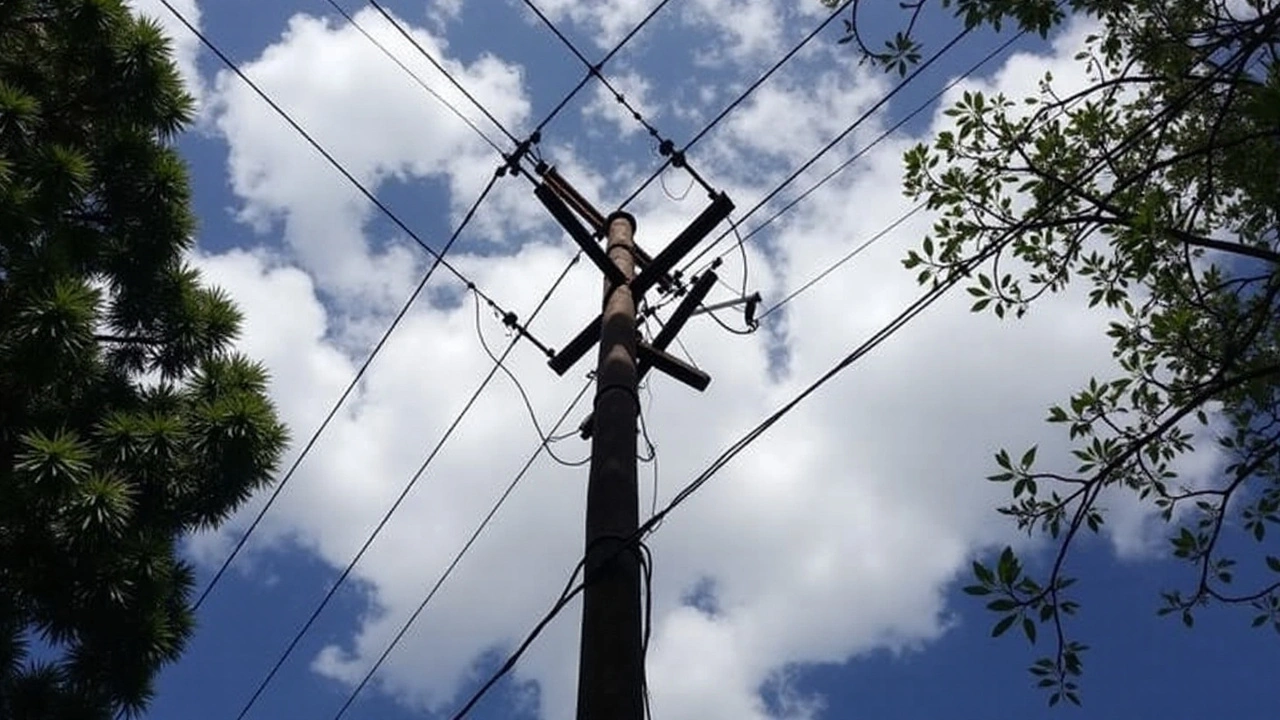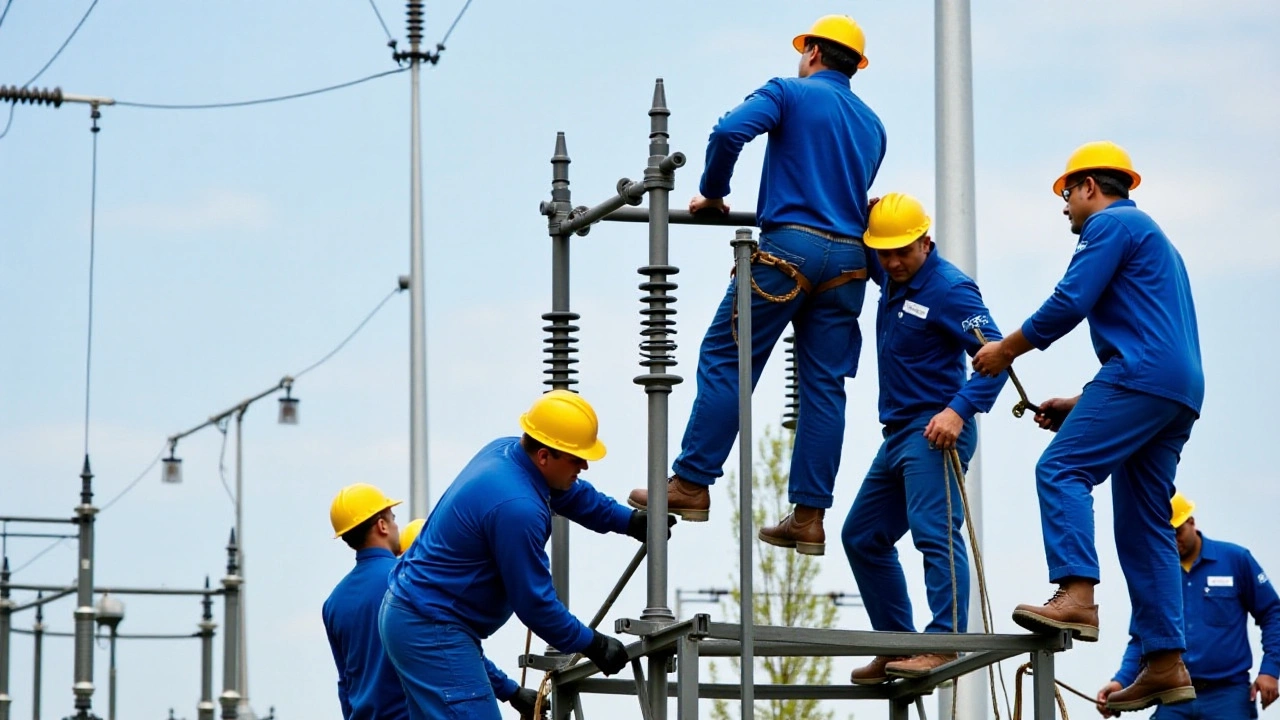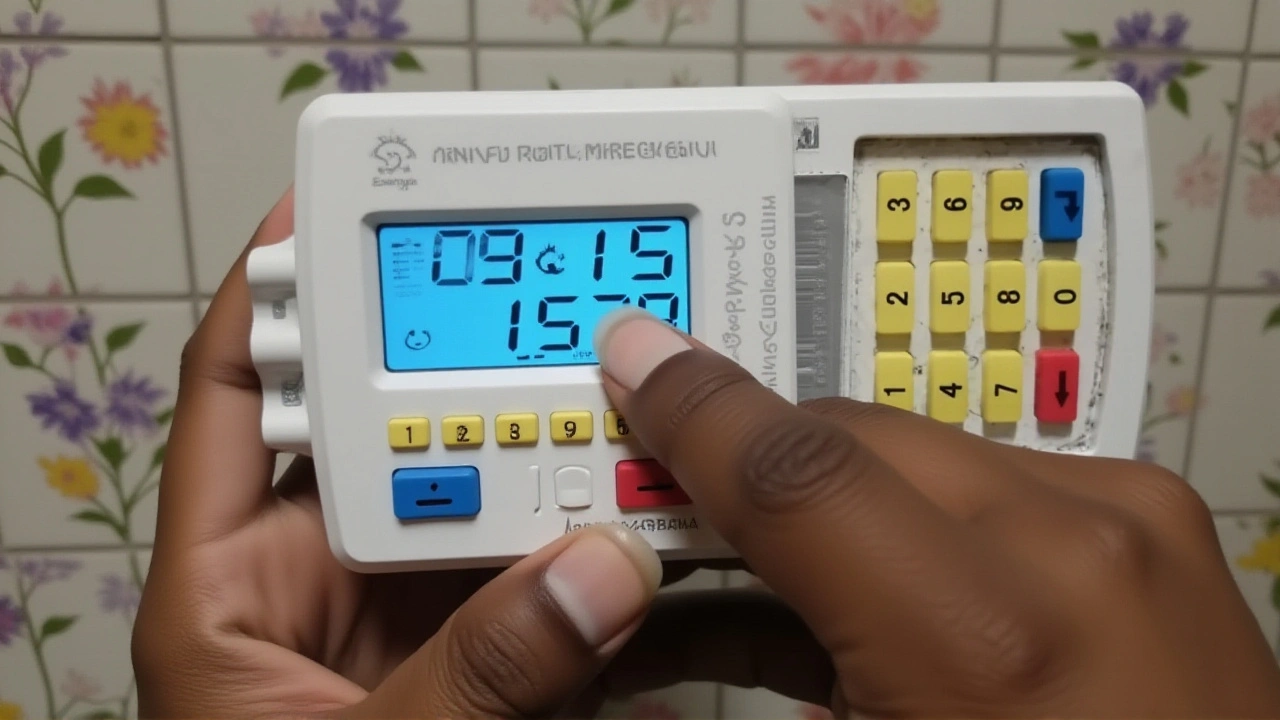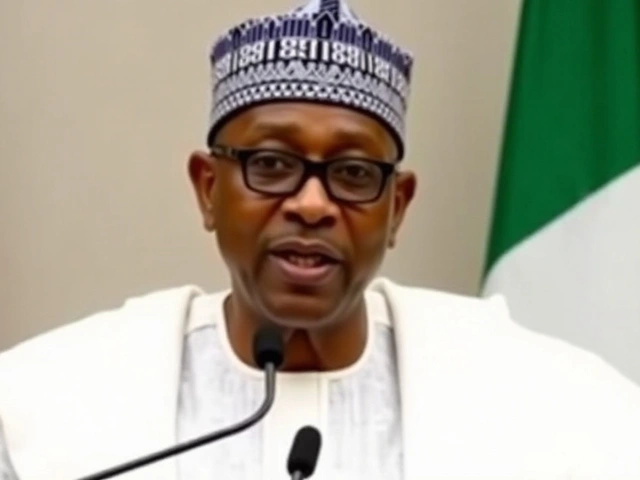Kenya Faces Another Major Power Blackout, Affecting Several Regions
Kenya Power has once again confirmed a significant power outage that has gripped several parts of the country. This substantial disruption comes just a mere six days after a previous widespread blackout, casting a shadow over the stability of the nation’s power infrastructure.
The latest outage, announced on September 6, 2024, left most regions in the dark, with the notable exception of the North Rift and Western regions. The affected areas have been plunged into uncertainty as businesses and households alike scramble to manage without electricity.
In a brief statement, Kenya Power abstained from revealing the exact cause behind this catastrophic service interruption. The company assured the public that a team of engineers is working tirelessly around the clock to restore normalcy. Despite the vast impact on daily life and economic activities, the power company remains committed to resolving the issue promptly.
An apology was extended to the public for the resultant inconvenience. Kenya Power has called for patience and understanding during this challenging period. The company vowed to keep the public informed on the progress of the restoration efforts and promised to share updates as soon as they become available.

The Repeat Blackout: A Crisis in Energy Supply
This blackout follows another significant outage on August 30, 2024, which similarly affected most parts of the country, excluding the North Rift and Western regions. The recurrence of such extensive blackouts within a short span raises crucial questions about the robustness and reliability of Kenya’s power infrastructure. Are these outages symptomatic of deeper systemic issues?
While Kenya Power has consistently pledged to enhance service reliability, the repeated blackouts might indicate underlying problems that require comprehensive solutions. The gaps in communication about the precise causes of these outages have only exacerbated public frustration and concern.
Residents and business owners in the affected regions have expressed growing dissatisfaction with the service inconsistencies. The unpredictability of power supply is taking a toll on small businesses, industries, and educational institutions, which rely heavily on a stable electricity supply to function effectively.
Impact on Daily Life and Economy
For many residents, these frequent outages feel like an unending cycle of disruption. Cooking, studying, and performing basic household chores become monumental tasks without a reliable power supply. Small businesses, which form the backbone of the Kenyan economy, are particularly vulnerable. From local eateries to internet cafes, the recurring power outages disrupt operations, leading to financial losses and customer dissatisfaction.
The agricultural sector, a significant part of Kenya’s economy, also suffers when electricity is unreliable. Irrigation systems reliant on electricity grind to a halt, affecting crop yields. The dairy industry, dependent on refrigeration, faces losses when milk and other perishables spoil. Similarly, the lack of power impacts hospitals and clinics that require electricity to run essential medical equipment.
Educational institutions are not immune to the ripple effects of power outages either. Schools and universities dependent on technology for teaching and administration face significant disruptions. Online classes, already a crucial element of modern education, are severely hampered, putting students at a disadvantage.
Kenya Power’s Response and Future Plans
In response to growing discontent, Kenya Power has laid out plans aimed at long-term solutions. The company is investing in infrastructure upgrades, including the modernization of transmission lines and substations. However, the execution of these plans often meets hurdles such as budget constraints and bureaucratic delays.
Public policy experts suggest that diversifying energy sources could mitigate such widespread outages. Investments in solar, wind, and geothermal energy could provide more stable and sustainable power solutions. Kenya, renowned for its abundant natural resources, has the potential to lead in renewable energy adoption, which could, in turn, reduce dependence on a vulnerable grid.
Furthermore, transparency and communication from Kenya Power are paramount. Clear and timely updates about the causes and measures being taken to prevent future disruptions can go a long way in restoring public confidence. Regular maintenance schedules and strategies for emergency response also need to be shared with the public to prepare for and mitigate the impacts of outages.
A Call for Patience and Cooperation
While the power company works to resolve the current crisis, it’s essential for the public to practice patience and cooperate with advisories from Kenya Power. There is a collective need to support measures aimed at long-term stability and reliability of the power supply.
Kenya's experience with power outages highlights a pressing need for systemic reforms. The burden on the public and the economy is profound, and a concerted effort is required to ensure such disruptions become a rarity rather than a norm.
The situation serves as a stark reminder of the importance of a resilient and diversified energy supply for economic stability and growth. As the country navigates these challenges, cooperation between the power company, government, and citizens will be crucial in charting a path towards a more stable and reliable energy future.








Naveen Kumar Lokanatha
September 6, 2024 AT 22:05 PMKenya's recurring outages are a clear sign that the grid needs urgent reinforcement. The repeated failures hurt small businesses and families alike. While Kenya Power promises upgrades the lack of transparent timelines fuels frustration. A more robust maintenance schedule could mitigate future blackouts. Communities deserve reliable power for daily life and economic growth.
Alastair Moreton
September 14, 2024 AT 12:29 PMWow, another blackout, how original.
Surya Shrestha
September 22, 2024 AT 02:53 AMIt is incumbent upon the regulatory bodies to conduct a thorough audit of the nation’s transmission architecture; such an audit must encompass load forecasting, redundancy protocols, and contingency planning. Moreover, the proclivity for opaque communication from Kenya Power undermines public trust, a trust that is essential for the successful implementation of large‑scale infrastructure projects. The recurrent nature of these outages suggests systemic deficiencies, not merely isolated technical glitches. Historical data indicates that similar disruptions have precipitated measurable declines in GDP growth, particularly within the manufacturing and agri‑business sectors. In addition, the absence of real‑time outage monitoring tools hampers rapid response efforts, thereby exacerbating economic losses. Stakeholders should consider the integration of smart grid technologies, which offer granular visibility and automated fault isolation capabilities. Furthermore, diversifying the energy mix to incorporate geothermal, solar, and wind assets would diminish reliance on any single generation source, thereby enhancing resilience. The government must allocate sufficient capital expenditure, while concurrently streamlining procurement processes to avoid bureaucratic bottlenecks. Transparent tendering, coupled with rigorous performance bonds, can ensure that contracted entities adhere to delivery schedules. Community engagement initiatives are also paramount; local populations must be educated on energy conservation practices to alleviate peak demand pressures. The establishment of micro‑grids in remote regions could provide localized power stability, reducing the strain on the central grid. Academic institutions should be encouraged to undertake collaborative research on grid stability, leveraging indigenous expertise. International partners may offer technical assistance, particularly in the realm of renewable integration and grid modernization. Finally, a comprehensive remediation plan, publicly disclosed and periodically updated, would demonstrate accountability and restore confidence among consumers. Only through a concerted, multi‑faceted approach can Kenya hope to avert future large‑scale blackouts and secure sustainable economic development.
Rahul kumar
September 29, 2024 AT 17:17 PMHey folks, if you’re looking for quick fixes, portable solar chargers can keep your phones alive during an outage. Also, many local hardware stores now sell affordable power inveters that can run small appliances for a few hours. Remember to rotate the use of generators to avoid over‑fueling and keep them outdoors for safety. Sharing these simple tools can make the blackout a bit more bearable for everyone.
mary oconnell
October 7, 2024 AT 07:41 AMIndeed, the ingenuity of improvisation is a testament to human resilience, though one might wonder if relying on ad‑hoc gadgets merely masks deeper infrastructural flaws. In the grand scheme, a society that celebrates makeshift solutions may inadvertently delay systemic reform. Yet, the ability to laugh at our own predicament is, perhaps, the most renewable resource of all.
Michael Laffitte
October 14, 2024 AT 22:05 PMWow, the sheer drama of turning off the lights and hearing the city hold its breath is something straight out of a thriller. I truly feel for every kid trying to finish homework by candlelight. Let’s rally together, share resources, and keep spirits high until the lights flicker back on. In moments like these, community bonds shine brighter than any bulb.
sahil jain
October 22, 2024 AT 12:29 PMGuys, keep those power banks charged and the morale high! 🎉 A little music on a battery‑powered speaker can turn a blackout into a mini‑festival. Also, stocking up on water and non‑perishable snacks helps the whole block stay chill. Let’s turn this outage into a chance to vibe together.
Bruce Moncrieff
October 30, 2024 AT 01:53 AMGreat energy! Just remember to rotate the use of generators to keep them from overheating, and always have a fire extinguisher nearby. If you need a step‑by‑step guide, I can drop a checklist in the comments.
Dee Boyd
November 6, 2024 AT 16:17 PMThe repeated negligence not only threatens economic stability but also endangers vulnerable populations who rely on medical equipment. Ethical responsibility demands immediate policy overhaul and transparent accountability.
Carol Wild
November 14, 2024 AT 06:41 AMIt is not a coincidence that these blackouts align perfectly with the government's sudden interest in foreign energy contracts; one must ask who truly profits from such disruptions. The narrative of “technical failure” conveniently diverts attention from the shadowy corridors where multinational conglomerates negotiate exclusive rights to Kenya's geothermal reserves. Historical parallels can be drawn to the 2015 outage, which, according to anonymous insiders, coincided with a clandestine acquisition of transmission assets by a private equity firm. Moreover, the timing of the current outage, just days before a major voting period, raises eyebrows about potential electoral manipulation through infrastructure sabotage. Some analysts argue that the absence of transparent investigation reports is a hallmark of a larger, orchestrated effort to suppress dissenting voices. The media's muted coverage further fuels speculation that a coordinated media blackout accompanies the power blackout, silencing critical discourse. Additionally, the rapid deployment of untested battery storage solutions-sourced from obscure overseas manufacturers-suggests a deliberate attempt to introduce backdoor vulnerabilities into the grid. These batteries, reportedly lacking proper certification, could be engineered to fail under specific load conditions, thereby creating engineered crises. The pattern is unmistakable: each outage serves as a pretext for the state to justify emergency powers, bypassing standard legislative oversight. Critics who dismiss these observations as mere paranoia ignore the extensive paperwork linking key officials to offshore shell companies. The confluence of political ambition, corporate greed, and strategic obfuscation forms a triad that threatens the very fabric of national sovereignty. In light of these connections, citizens must demand a forensic audit, not only of the physical infrastructure but also of the financial flows that underpin it. Only through relentless scrutiny can we hope to untangle the web of vested interests that profit from our darkness. Furthermore, the international community's silence on these matters may indicate a tacit endorsement of the status quo. Until transparency is restored, the cycle of engineered outages will likely continue unabated.
Rahul Sharma
November 21, 2024 AT 21:05 PMWhile the concerns raised merit thorough investigation, it is essential to ground our analysis in verifiable data and avoid extrapolating speculative conspiracies; a systematic audit of the grid’s operational logs, coupled with third‑party oversight, would provide concrete evidence regarding any irregularities. Additionally, engaging independent energy experts to assess the technical integrity of recent battery deployments can dispel unfounded rumors and restore public confidence. By prioritizing transparency, we can address legitimate governance issues without descending into paranoia.